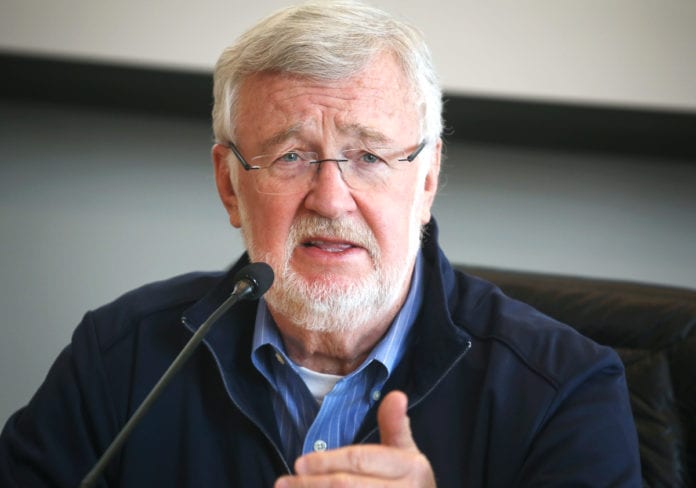Legislators trying to balance the need for public access with the critical issue of passing a budget are now limiting access to the state capitol while the public participates via written and telephonic testimony.
Effective March 13, access to the capitol itself was limited to lawmakers, legislative and gubernatorial employees and credentialed journalists. Legislative work will continue as usual and Alaskans will be able to participate fully in the public process by following along on Gavel Alaska, AKL.tv, as well as their personal testimony. The announcement came from the newly formed Legislative Council Subcommittee on Emergency Response and Preparedness, chaired by Sen. Gary Stevens, R-Kodiak.
“To protect Alaskans and ensure the people’s business continues in a timely and transparent manner, the Legislature has acted to limit the spread of the virus,” Stevens said. “After several lengthy discussions, and in accordance with CDC (Centers for Disease Control) guidelines, we will reduce interpersonal contact in the Capitol to limit exposure to the new coronavirus.”
“This is a very tough situation,” Stevens said. “On one hand, every legislator wants to keep this building open to the public, but we are in new territory.”
“My concern is what happens if some folks in the building get sick. We have some very strict requirements. We cannot vote on the floor unless we are there, and some issues require a three-quarters vote of the legislature,” he said. “We are trying to get our job done fairly quickly, including the budget, and to confirm the governor’s appointments to a few commissioner positions and several committees out there before we adjourn. Otherwise they all disappear and cannot be reappointed if we don’t appoint them by the end of the session. Some bills have to be passed because if they are not passed those agencies cease to exist.”
“We are really lucky here in Alaska because we are at the end of the line. It hasn’t happened to any Alaskans yet. Washington (state) is the epicenter, but Alaska has had more time to be prepared. Hand washing is crucial; hand sanitizer and social distancing and not putting yourself in jeopardy in large crowds. This really is a different world right now. The stock market will come back. Oil (prices) will come back. We are doing a cautious approach,” he said.
“Alaskans elected us to lead and that’s what we’re doing,” said House Speaker Bryce Edgmon, I-Dillingham. “We’re committed to continuing our legislative work, which includes making sure healthcare workers have the tools they need to slow the spread of COVID-19. We will work closely with our local and federal partners to monitor the progress of this disease and to make sure supply chains continue to provide essential goods to communities across our state. The session will continue to broadcast on Gavel Alaska and AKL.tv so the public is up to date on our work to keep Alaskans safe.”
The five-member subcommittee also include House Minority Leader Lance Pruitt, R-Anchorage; Senate Minority Leader Tom Begich, D-Anchorage; and Senate President Cathy Giessel, R-Anchorage.
Both houses have already also expedited passage of a mental health budget approving $13.1 million in emergency coronavirus federal and state funding. That includes $9 million in federal funds to make sure everybody will have access to the public health system, Stevens said.
“Many of us have had seasonal flu,” he said. “We want to make sure everyone gets the flu vaccine.”
Legislators also passed House Bill 29, which expands access to telemedicine. Under HB 29, telemedicine benefits for covered health care services, including mental health benefits, will be reimbursable for health care providers licensed in Alaska without an initial in person appointment, said Rep. Ivy Spohnholz, D-Anchorage, sponsor of the bill.






